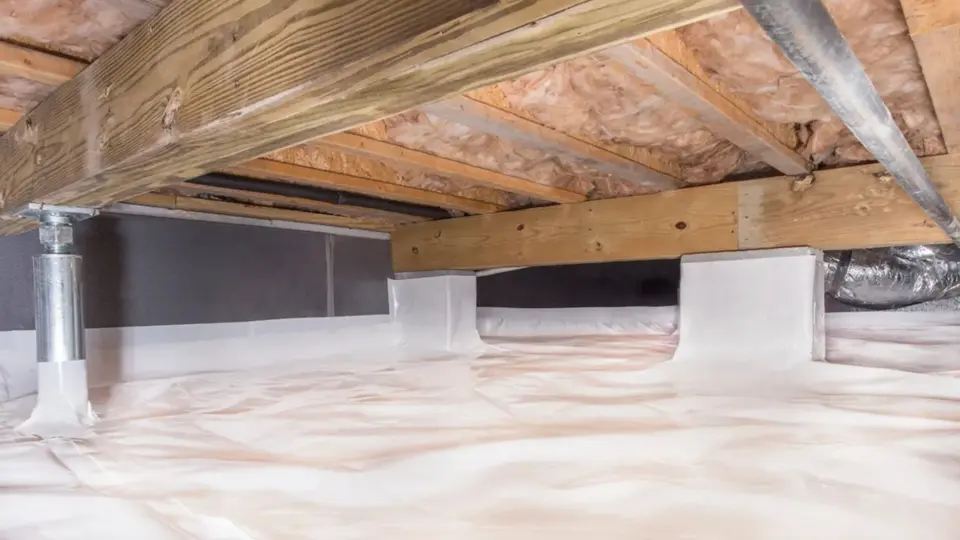
Crawl spaces are often overlooked areas of a home that can significantly impact the overall health and safety of the structure. Excavating a crawl space, which involves digging out the dirt and possibly lowering the floor to allow for better access or installing systems like plumbing and HVAC, can be critical for many homeowners.
However, it’s essential to approach this task with a thorough understanding of the potential risks, evaluation processes, costs, and structural considerations.
What Are The Common Risks Associated With Excavating A Crawl Space?
Excavating a crawl space presents various risks that must be carefully managed to avoid any negative impact on the home and its residents. Here’s a deeper look into the common risks associated with this procedure:
- Foundation Undermining: Excavating a crawl space typically involves removing soil directly beneath a home’s structure. This can potentially weaken the foundation, as it may lose the critical support of the surrounding ground. If the excavation isn’t conducted with precision and the oversight of a structural engineer, there’s a risk of foundation settlement or even collapse. Ensuring that any excavation is closely monitored and supports are properly installed is crucial in preventing structural damage.
- Increased Moisture Levels: Opening up the earth within a crawl space exposes it to natural elements, primarily moisture. This moisture can accumulate if not properly managed with adequate drainage and ventilation systems. Over time, persistent moisture can lead to mold and mildew, affecting the structural integrity of wooden components by causing rot and posing health risks to the inhabitants through reduced air quality.
- Release of Radon Gas: Disturbing the soil can also lead to the release of radon gas, a colorless, odorless radioactive gas naturally occurring in certain types of soil and rock. According to health experts, radon exposure is the second leading cause of lung cancer after smoking. Proper ventilation and radon mitigation systems must be installed when high radon levels are detected during the pre-excavation assessments.
Understanding these risks and taking appropriate measures to mitigate them is essential. It involves the technical aspects of excavation and ensuring that the crawl space remains a safe and stable environment. Utilizing professional services for such tasks is advisable to maintain the integrity and safety of your home.
How Do Professionals Determine If A Crawl Space Needs Excavation?
Deciding whether a crawl space needs to be excavated involves several considerations, primarily focusing on the current and intended use of the space.
Professionals will first assess the accessibility and adequacy of the existing crawl space for maintenance and repairs of utilities like plumbing, electrical systems, and HVAC. They will also check for signs of structural damage or moisture issues that might necessitate excavation to implement more effective moisture barriers or drainage solutions.
The evaluation process may include a thorough inspection for pests, rot, mold, and overall structural integrity. Soil testing may also assess the presence of radon or other soil contaminants that could influence the decision to excavate.
What Are The Typical Costs Involved In Excavating A Crawl Space?
Understanding the costs associated with excavating a crawl space is crucial for homeowners considering this substantial home improvement project. The expenses can vary significantly based on several key factors, making it important to get a comprehensive view of what affects the overall pricing. Here’s a more detailed look into the factors influencing the costs:
- Size of the Crawl Space: The larger the crawl space, the more labor and materials are required to complete the excavation. This straightforward correlation directly affects the base cost; larger areas mean more digging time, soil disposal, and potentially more complications.
- Depth of Excavation Required: Deeper excavations demand more work and have higher risks, such as additional shoring up of the home’s foundations. This can increase the labor hours and the need for specialized machinery, raising costs.
- Accessibility of the Space: If the crawl space is hard to access, extra work might be required to bring in equipment or modify existing structures to reach the area. Limited accessibility can lead to higher labor costs due to the increased time and difficulty maneuvering equipment and materials.
- Location of the Property: Geographic location can affect costs due to local regulations, availability of professional services, and even the cost of disposing of excavated soil. Additionally, transportation costs for heavy machinery and materials can vary by region.
- Additional Supports for the Home’s Foundation: If the home’s structural integrity needs bolstering during the excavation, this can significantly increase costs. Installing underpinning or pilings to ensure the house’s stability during and after the excavation adds to the budget.
- Installation of Moisture Control Systems: Proper moisture management is critical in crawl spaces to prevent mold and wood rot. The installation of drainage systems, vapor barriers, or dehumidifiers will increase the project’s total cost.
- Discovery of Hazardous Materials: The presence of hazardous materials, such as lead or asbestos, necessitating specific care, can significantly raise the overall cost. Additional labor and disposal expenses will be incurred due to the precise requirements that must be followed for the safe removal and disposal of these materials.
Given these variables, homeowners are advised to obtain multiple estimates from reputable professionals. This not only gives a clearer picture of the expected costs but also ensures that all potential aspects of the excavation are considered and budgeted for. This preparation helps in avoiding unexpected expenses and ensures a smoother execution of the project.
Can Excavation Of A Crawl Space Affect The Structural Integrity Of A Building?
The short answer is yes, excavation can affect the structural integrity of a building, but when done correctly, it should not negatively impact the home. Professional excavation teams use techniques to reinforce the home’s foundation and structure throughout the process. This might include underpinning the foundation with supports before removing soil or installing pilings to ensure stability.
Properly planned and executed, excavation should enhance the home’s value and safety, making it a worthwhile consideration for resolving issues related to inadequate crawl space height, moisture, or soil contamination.
When contemplating excavating a crawl space, it’s essential to understand the potential risks and benefits clearly. Homeowners should consult with structural engineers or specialized excavation professionals who can provide detailed assessments and recommendations tailored to their needs.
This thoughtful approach will help ensure that any excavation project enhances the home’s functionality and safety, avoiding unnecessary complications or expenditures.
Why Choose Freedom Crawlspace Services?
Freedom Crawlspace Services specializes in transforming the daunting task of crawl space excavation into a smooth, stress-free experience. Renowned for precision, reliability, and transparency, we are the top choice for homeowners seeking quality and peace of mind.
Our seasoned experts leverage state-of-the-art technology and methods to secure your home’s structural safety and enhance its value and functionality. We take a consultative approach, customizing solutions to each homeowner’s needs and budget.
Our team meticulously manages every step, from the initial inspection to the final details of the excavation. Fully licensed and insured, Freedom Crawlspace Services adheres to the latest building codes and standards, ensuring compliance and high-quality workmanship. Our unmatched customer satisfaction and safety commitment make us the ideal partner for your crawl space excavation needs.
Frequently Asked Questions About Crawl Space Excavation
What is the typical cost range for excavating a crawl space? The cost of excavating a crawl space varies depending on several factors, such as the size of the space, the complexity of the work, and any additional repairs or installations needed. At Freedom Crawl Space Services, we offer comprehensive excavation services typically ranging from $5,000 to $15,000. We provide detailed estimates after a thorough inspection to ensure transparency and help you plan your budget effectively.
How long does the excavation process take? The duration can vary, but most residential crawl space excavations are completed within 3 to 5 days. Our team works efficiently to minimize disruption and ensure that your home is back to normal as quickly as possible.
Will I need to vacate my home during the excavation? In most cases, no. Our techniques are designed to be minimally invasive, allowing you to maintain your daily routine without significant interruption.
How can I prepare my home for crawl space excavation? Preparing your home for excavation mainly involves clearing personal belongings from the work area and ensuring our team has easy access to the crawl space. We will provide you with a detailed checklist of steps to take before the project begins to ensure everything goes smoothly.
Let Us Reclaim Your Space!
Ready to enhance the functionality and safety of your home? Contact Freedom Crawlspace Services today! Our friendly team is here to answer any questions and guide you through every step of the crawl space excavation process. With our expertise and your vision, we can transform your crawl space into a solid foundation for your home.
Call us now or visit our website to schedule your free consultation and start your journey towards a safer, more efficient home. Let’s reclaim your space together!
